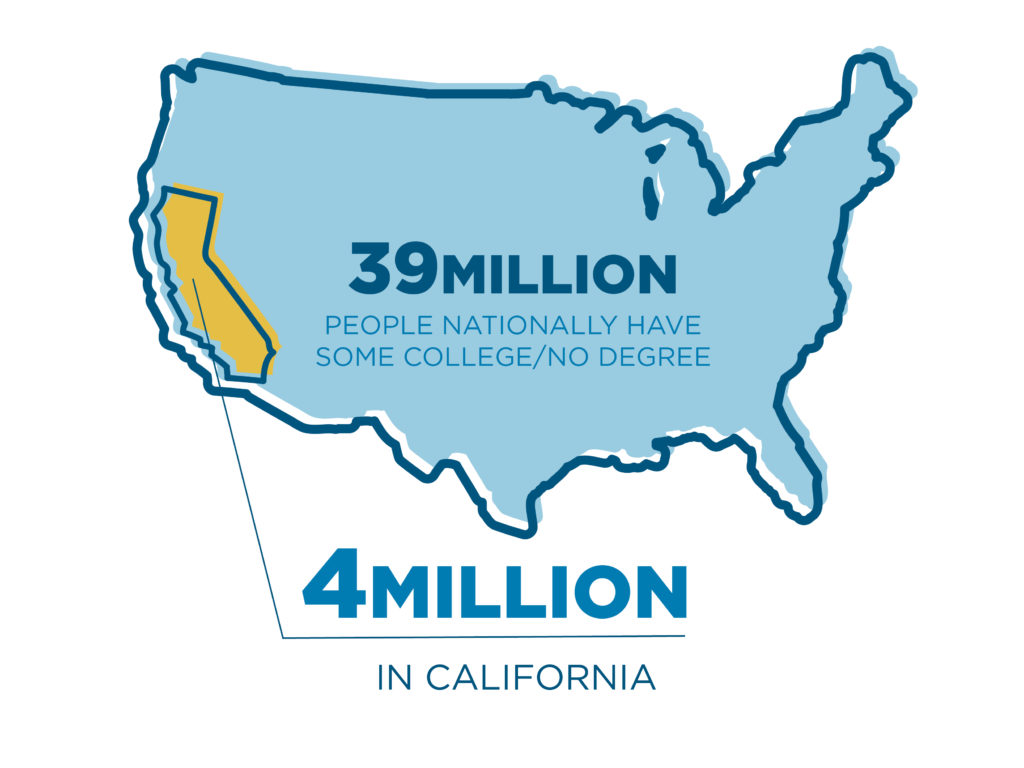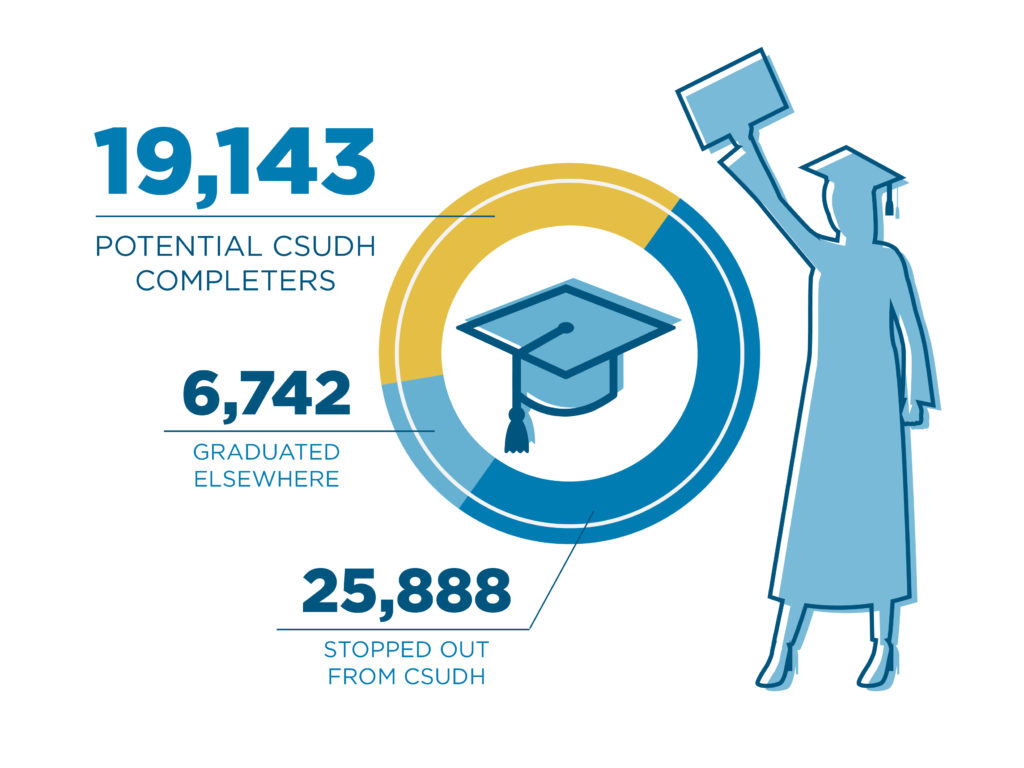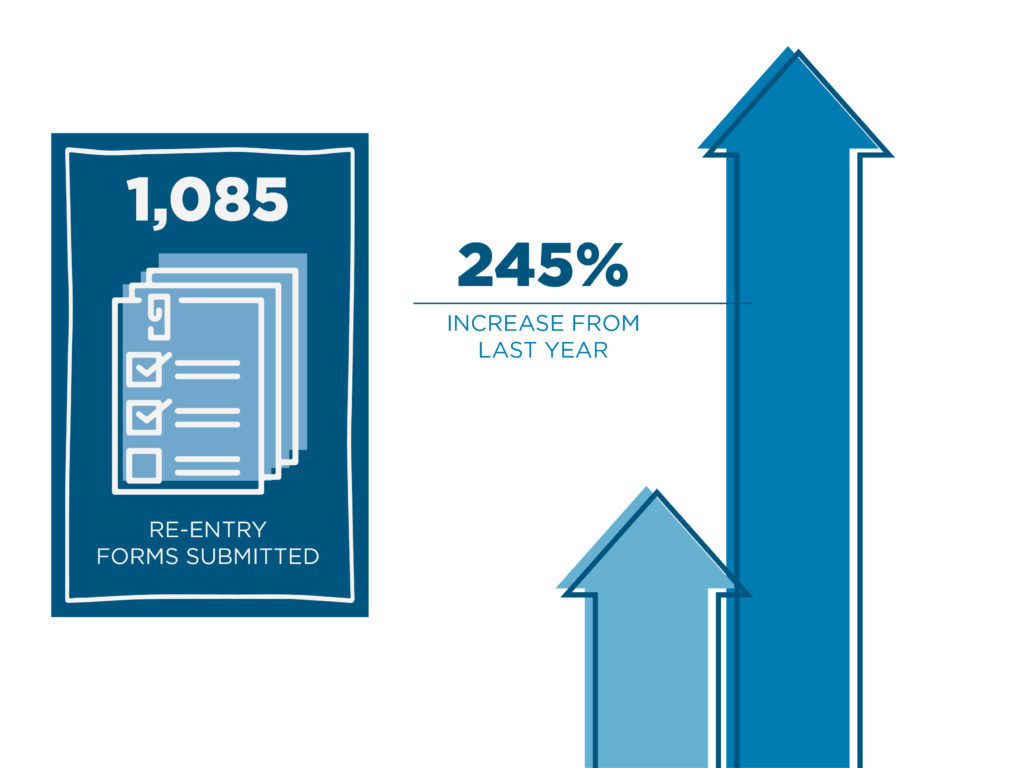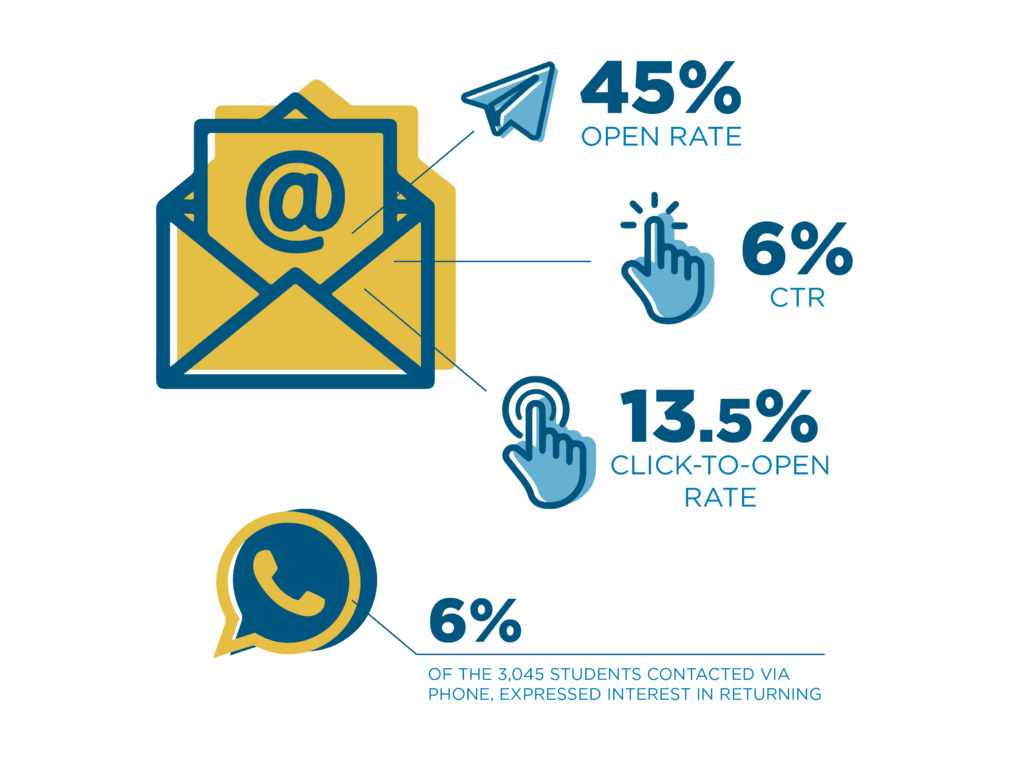CSU Dominguez Hills Grows ‘22-’23 Reenrollment by 245% With MindMax
Compassionate Reenrollment Strategy Brings Stopout Students Back to School
Background
At California State University, Dominguez Hills, students receive transformational educational experiences grounded in culturally sustaining practices, innovative research, creative activity, and community engagement. After the 1965 Watts Rebellion, CSUDH was strategically located to bring educational opportunities to underserved communities in South Los Angeles.
MindMax is proud to be a continuing partner to CSUDH, whose values include:
- Academic excellence and intellectual curiosity
- Justice, equity, diversity, and inclusion
- Sustainability
- Communication and collaboration
- Shared governance
The University’s exceptional educational programs enable increased personal and professional success, enhanced economic and social mobility, and mutually beneficial and reciprocal relationships with the surrounding communities as well as the local K-12 and community college systems.
The Challenge
Challenged to increase reenrollment of stopout students, CSUDH approached MindMax for strategic support in:
- Reenrolling stopout students
- Eliminating barriers to completion
- Ensuring ongoing success for reenrolled students
Stopout Students: A Growing Concern

Throughout higher education, concerns have taken root over the growing population of stopout students—those with “some college, no credential” (SCNC). California alone is home to at least 4 million stopout students, and researchers estimate that as many as 39 million American adults have attended college but never earned a degree or other credential. The latest numbers reflect an 8.6% increase in SCNC students since 2019.
Why students stop out
CSUDH’s student population is notably higher risk than many other student bodies throughout the US. The University’s most vulnerable students report a range of socio-economic factors as contributors to their decisions to withdraw from higher education. According to a study on Disengaged Learners:
- 42% of students reported stopping out for financial reasons
- 32% of students cite family or personal commitments as their motive for stopping out
Who stops out?
Understanding who stops out and who reenrolls is the first step toward improving future college recruiting.
- 59% of reenrollees are women (reflecting women’s share of the overall student population), but the gender gap widens among Black, Latinx, and Native stopout students and narrows among White, Asian, and older students
- 11% of all SCNC students are people age 64 and older
- 55% of 2019-20 reenrollees returned to classes the following year
- Black, Latinx, and Native students are least likely to remain in college after reenrollment
Who reenrolls?
- Students aged 25 and younger are most likely to reenroll
- In the 2020-21 academic year, over 10% of under-25 SCNC women reenrolled, while only 6.7% of under-25 SCNC men reenrolled
- 0.1% of 64-and-older SCNC students reenrolled
- Two-thirds of 2021-22 reenrollees were under 35 years of age
- 2.4% of SCNC students nationwide reenrolled in 2020-21 classes
Who completes their certificate or degree?
- White and Asian students are most likely to complete their degree or certificate after reenrolling
- Black students are more likely to receive certificates upon graduation
- LatinX students most commonly receive associate degrees upon graduation
- Asian students primarily obtain bachelor’s degrees upon graduation
- 69% of stopped-out students reenroll to earn associate degrees and non-degree certificates
- Reenrollees pursuing bachelor’s degrees are 9% more likely to major in business than the general undergraduate population, with 27% of all bachelor’s-level reenrollees majoring in business
The Solution: Compassionate Reenrollment Initiatives
When a person is prevented from completing their degree due to circumstances beyond their control, their potentially transformative educational experience can become a source of shame and regret. Schools that embrace compassionate reenrollment initiatives are primed to make a meaningful, lasting difference in the lives of stopout students.
CSUDH selected MindMax to develop a tailored reenrollment strategy for the University’s stopout student body.

About compassionate reenrollment
CSUDH and MindMax agree: compassionate reenrollment is an ethical imperative. Compassionate reenrollment meets students where they are, rejects the belief that stopping out is shameful, and promotes every individual’s right to a safe space for learning and building lifelong skills.
First step: Listening to stopout students
MindMax and CSU Dominguez Hills embarked on a listening tour. Through a series of live interactive sessions with stopout students, our teams gleaned insight into the barriers faced by vulnerable student populations.
One young student was forced to abandon her undergraduate degree when she had a baby, lost her employment, and had to resort to living out of her car. Other students were financially overcome by divorce, illness, or natural disasters. Some shared stories of forgoing their personal goals to care for aging parents or children with special needs.
Nearly all of the stopout students who attended the listening tour expressed interest in returning to CSUDH to complete their degrees. But for many, the obstacles that forced them to stop out in the first place remained. They also expressed concerns about their ability to pay, along with worries that they wouldn’t fit in among first-time freshmen and transfer students.
Second step: Developing a reenrollment campaign
CSUDH developed the name for their reenrollment campaign: Once a Toro, Always a Toro. This initiative established a pathway to degree completion that meets four key objectives:
- Remove barriers to reenrollment by supporting the unique needs of adult learners
- Credit students for their previous professional experience and skills
- Offer high-quality, personalized advising and coaching
- Connect program faculty and industry partners to offer relevant student support services and develop a curriculum around the needs of today’s workforce
The school then tasked MindMax with helping execute the aims of Once a Toro, Always a Toro by reconnecting with students who had stopped out and encouraging them to reenroll at CSUDH. MindMax built a custom program based on its well-established enrollment management services.
Using a combination of phone and 1:1 email outreach, the MindMax team connected with former students, assessing their interest in returning to the University, answering their questions, and offering support and next steps for students who expressed a desire to reenroll.
Third step: Streamlining reenrollment
To fast-track reentry for returning students, MindMax and CSUDH created a simple, one-page reengagement form to minimize paperwork and reduce friction in the reenrollment process. After some administrative negotiation, CSUDH waived application fees and addressed registration barriers such as old library fines or unpaid campus parking tickets to ensure these obstacles did not prevent a student from coming back to campus.
The University also adapted to deliver comprehensive student support services, including helping students with financial aid, admissions, class registration, and academic advising.
Results


In 2021, 25,885 CSU Dominguez Hills students were considered “potential completers,” meaning they had high potential because they had earned at least two years of college credit but left with no degree. 6,742 of those students graduated elsewhere, leaving a pool of 19,143 potential completers for the Once a Toro, Always a Toro campaign.
Phone calls were most effective at reaching stopout students, with MindMax’s signature high-touch approach achieving impressive reenrollment results. Focusing on reenrollments for fall 2022 and spring 2023, the MindMax enrollment management team placed more than 8,000 calls to just over 3,000 stopout students and engaged in personal conversations, learning their stories and offering reenrollment support.
They also sent thousands of personalized emails, achieving an average open rate of 45%, click-through rate (CTR) of 6%, and click-to-open rate of 13.5%.
As of the date of publication of this case study, those efforts garnered significant results. 1,085 students submitted reenrollment forms, an increase of 245% from the previous year. And with each student needing to take an estimated 25 credit hours to complete their degree, the potential economic benefit to CSUDH is over $6 million.
What We Learned
To date, the Once a Toro, Always a Toro campaign provided several learning opportunities for MindMax and CSUDH.
- Outreach was successful because we listened and learned with an agile mindset
- Streamlining the reenrollment process is a multi-faceted, deeply complex process that requires ongoing adaptation
- Reenrolled students have acknowledged the significant impact of our outreach, and we expect to continue the compassionate reenrollment approach for many years to come
- Students largely declined standard degree completion programs, instead preferring to finish the degrees they’d started before stopping out.
As always, opportunities for improvement abound. Effective reenrollment can advance only with:
- More student support resources at CSUDH
- Ongoing data gathering and updates
- A permanently streamlined reentry process
- Longer lead times between outreach and registration deadlines
Conclusion
Guided by compassionate reenrollment, Once a Toro, Always a Toro proved tremendously beneficial for the University and its students. Reenrollment helps CSUDH achieve its economic potential while supporting students to build meaningful futures in their community.
Watch our webinar to learn more about compassionate reenrollment strategies, or contact MindMax to begin developing a reenrollment program at your own institution.